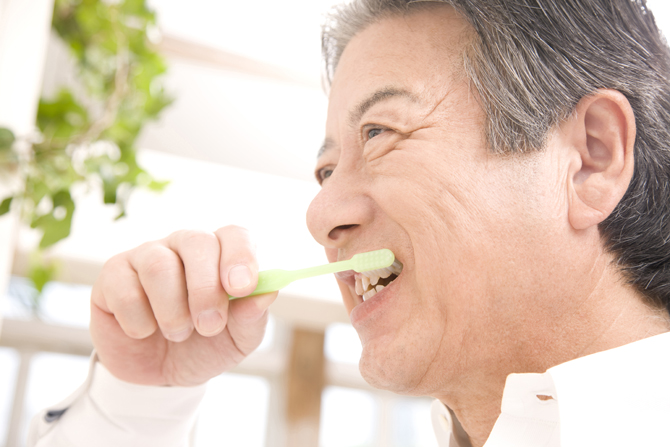08 December 2014
Care for Your Teeth and Gum

Since a young age we have been told the importance of oral care, but it is often too late when gum inflammation and teeth loss wake us up to our negligence to oral hygiene maintenance. Dr Sigmund Leung Sai-man, JP, President of the Hong Kong Dental Association Ltd., sheds light on periodontitis, the different types and stages of periodontal diseases, and why regular dental check-up and proper oral care are essential as a preventive measure for periodontal diseases.
Types and Stages of Periodontal Diseases
With characteristics including inflammation or infection – and consequential bleeding – of the gum, erosion of the bone that supports the teeth, and eventually possible teeth loss as a result, periodontitis is a type of periodontal disease, which can be broadly categorised into three different stages or types.
"The symptoms of chronic periodontal disease is usually very subtle and therefore not noticeable, which is why the disease would have progressed by the time patients are prompted to seek treatment," said Dr Leung, who added that chronic periodontal disease usually appears in the forms of redness, bleeding or swelling of gum. "If not properly treated, chronic periodontal disease could progress into acute periodontal disease, which is characterised by acute swelling and pronounced pain at even the slightest touch of the gum, and pus collection and discharge in the gum. There is also a less common type of periodontal disease called aggressive periodontitis, which affects around one in 100 people in Hong Kong, and mostly people in their 20s and 30s. The level of teeth-gum attachment and bone destruction is so rapid that even the molars may become loose, and this type of periodontal disease can be further categorised into 'localised' and 'generalised', depending on its time of onset, the serum antibody's response to infective agents, the types of teeth affected, and the presence of gingival inflammation."
Causes of Periodontal Diseases
According to Dr Leung, periodontal diseases are not related to age, but their onset tends to come at senior age because the causes are accumulated over the years. "The biggest cause of the majority of periodontal diseases is negligence. People currently in their 40s or over, for example, are not the beneficiaries of the School Dental Care Service as the scheme hadn't even come into effect back then, and are therefore less informed on proper oral care. The lack of information on the proper way to brush teeth with the right kind of toothbrush can have long-lasting repercussion: when the bristles of a toothbrush fail to thoroughly clean the gingival margin, food residue will eventually encourage bacterial growth, and a periodontal pocket between the gum and the teeth will be formed," said Dr Leung, who added that dentists would use an apparatus called the periodontal probe, with markings, to measure the depth of the pocket, and any measurement deeper than 3mm is considered in need of treatment.
"And as our body's defence mechanism deteriorates with age, so does our gum's repair ability, rendering senior citizens more vulnerable to the diseases. Meanwhile, smokers are five to 10 times more prone to periodontal diseases because smoking hinders the circulation of micro blood vessels, which in turn slows down gum repair, and that could affect the success of dental implant too. Also impeding circulation of micro blood vessels is diabetes: certain case studies have revealed that senior citizens with diabetes suffer a greater intensity of periodontal diseases compared to their non-diabetic counterparts."
Perhaps lesser known is that pregnancy and mental stress are also likely causes of periodontal diseases, as hormonal fluctuation is often the culprit of gum swelling. In addition, Dr Leung also has a word of advice for senior citizens who use dentures. "Dentures could lead to a vicious cycle in oral hygiene especially when food residue accumulates inside the dentures, not to mention the pressure that the application of dentures causes to the gum, resulting in gum inflammation." Genetic makeup is rarely a cause of periodontal diseases, said Dr Leung, although people with a family history of aggressive periodontitis may be more likely to inherit the disease.
Be Pre-emptive in Seeking Treatments
If left untreated, periodontal diseases could cause more than just inconvenience in eating, as severe cases may lead to permanent teeth removal. Which is why it is important to seek help or advice from a dentist as soon as abnormalities in the gum is spotted. "Scaling is the most common type of non-surgical periodontal treatment, while patients with periodontal pockets will require deep scaling and root planing. Surgeries, on the other hand, tend not to be very effective, although teeth removal is necessary for severe cases."
What Dr Leung can't stress enough is the most effective preventive measure for periodontal diseases: "Consult the dentist for oral hygiene maintenance instructions. Be sure to brush your teeth twice a day, with toothbrush with soft bristles, use fluoride toothpaste to prevent tooth decay, and clean proximal surface with floss or interdental brush. Last but not least, always remember to have regular dental check-up: many senior citizens in their 60s and 70s have proved that regular dental check-ups are an effective way to spare them from periodontal disease."
Special Thanks:
Dr Sigmund Leung Sai-man, JP, President of the Hong Kong Dental Association Ltd.
Wellness

